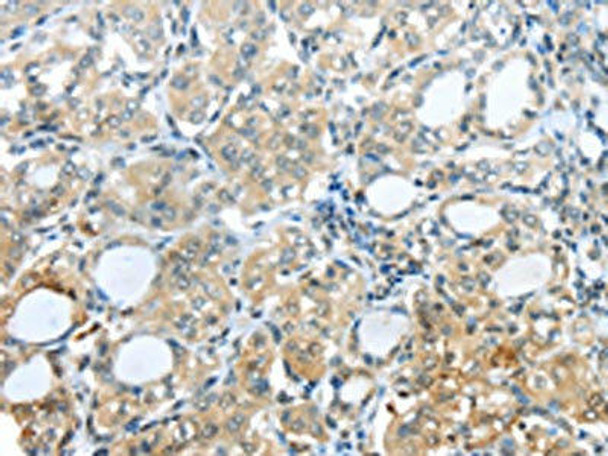| UniProt Protein Function: | PAK3: a protein kinase of the STE20 family that regulates synapse formation and plasticity in the hippocampus. May be necessary for dendritic development and for the rapid cytoskeletal reorganization in dendritic spines associated with synaptic plasticity. Forms an activated complex with GTP-bound P21, CDC2 and RAC1 proteins. Missense and truncation mutations linked to nonsyndromic mental retardation type 30 (MRX30). Two alternatively spliced human isoforms have been reported. |
| UniProt Protein Details: | Protein type:Protein kinase, STE; Protein kinase, Ser/Thr (non-receptor); Kinase, protein; EC 2.7.11.1; STE group; STE20 family; PAKA subfamily Chromosomal Location of Human Ortholog: Xq23 Cellular Component: cytoplasm; cytosol; endosome; plasma membrane Molecular Function:ATP binding; MAP kinase kinase activity; metal ion binding; protein binding; protein serine/threonine kinase activity; Rac GTPase binding; SH3 domain binding Biological Process: actin cytoskeleton organization and biogenesis; activation of MAPK activity; axon guidance; axonogenesis; cell migration; dendrite development; ephrin receptor signaling pathway; innate immune response; MAPKKK cascade; positive regulation of neuron apoptosis; regulation of actin filament polymerization; regulation of apoptosis; regulation of mitotic cell cycle; Rho protein signal transduction; small GTPase mediated signal transduction; stimulatory C-type lectin receptor signaling pathway; stress-activated protein kinase signaling pathway; synapse organization and biogenesis; T cell costimulation; T cell receptor signaling pathway; vascular endothelial growth factor receptor signaling pathway Disease: Mental Retardation, X-linked 30 |
| NCBI Summary: | PAK proteins are critical effectors that link Rho GTPases to cytoskeleton reorganization and nuclear signaling. PAK proteins, a family of serine/threonine p21-activating kinases, serve as targets for the small GTP binding proteins Cdc42 and RAC and have been implicated in a wide range of biological activities. The protein encoded by this gene forms an activated complex with GTP-bound RAS-like (P21), CDC2 and RAC1 proteins which then catalyzes a variety of targets. This protein may be necessary for dendritic development and for the rapid cytoskeletal reorganization in dendritic spines associated with synaptic plasticity. Defects in this gene are the cause of non-syndromic mental retardation X-linked type 30 (MRX30), also called X-linked mental retardation type 47 (MRX47). Alternatively spliced transcript variants encoding different isoforms have been identified. [provided by RefSeq, Jul 2008] |
| UniProt Code: | O75914 |
| NCBI GenInfo Identifier: | 47117818 |
| NCBI Gene ID: | 5063 |
| NCBI Accession: | O75914.2 |
| UniProt Secondary Accession: | O75914,Q5JWX1, Q5JWX2, Q7Z2D6, Q7Z2E4, Q7Z3Z8, Q8WWK5 Q8WX23, A8K389, B1GX77, B1GX78, B1GX79, |
| UniProt Related Accession: | O75914 |
| Molecular Weight: | 62,913 Da |
| NCBI Full Name: | Serine/threonine-protein kinase PAK 3 |
| NCBI Synonym Full Names: | p21 protein (Cdc42/Rac)-activated kinase 3 |
| NCBI Official Symbol: | PAK3 |
| NCBI Official Synonym Symbols: | bPAK; MRX30; MRX47; OPHN3; PAK-3; PAK3beta; beta-PAK |
| NCBI Protein Information: | serine/threonine-protein kinase PAK 3 |
| UniProt Protein Name: | Serine/threonine-protein kinase PAK 3 |
| UniProt Synonym Protein Names: | Beta-PAK; Oligophrenin-3; p21-activated kinase 3; PAK-3 |
| Protein Family: | Serine/threonine-protein kinase |
| UniProt Gene Name: | PAK3 |
| UniProt Entry Name: | PAK3_HUMAN |













